- Home
- Jojo Moyes
The Horse Dancer Page 5
The Horse Dancer Read online
Page 5
Sarah watched the forty-minute display in silence. She was mesmerised. She wanted to go to Boo and copy what she had seen. He could do this, she knew it. He was finer, stronger, than some of the horses she had seen on the screen, but he had the same power: she had felt it beneath her often enough. As she watched, her hands and feet twitched, riding the screen horses, encouraging them into the outlines, the movements that had been performed since ancient Greek times.
Her personal arena might have been a bare-patched, litter-strewn park rather than the vast palace of an historic French town, her outfit jeans and a T-shirt instead of a formal black jacket, gold braid and a peaked cap. But she knew how those men felt: when the camera had lingered on their faces, taut with effort and sympathy, with wanting, she had felt kinship as she never had with the girls at school. All the things Papa had been teaching her began to slot into place. He said they had years of work ahead of them. He said letting her try would be like Cowboy John attempting a marathon, cigarette in hand. And now she saw what he was aiming for, the great goal: capriole. The most complex, demanding and beautiful movement a horse could make, taking all four hooves off the ground into a balletic leap, lifting as if it was weightless, kicking out behind in mid-air as if it scorned the laws of gravity. Beautiful. Fearsome. Awe-inspiring.
Sarah had never been able to say what she felt when Papa went on and on about the French school, which was, what chance did they really have? Despite what he said, she had never been able to translate her life at Cowboy John's and their training sessions in the park into the future he had described. Now, as she watched the credits, she realised the DVD had had the opposite effect to the one he had wanted. It had simply confirmed that Papa was indulging a dream. It didn't matter how good her horse was. How could anyone make the most gravity-defying leap of all, from the back-streets of London to the polished glory of Le Cadre Noir?
She felt guilty almost as soon as she had thought it. Her eyes went to him, and she wondered if her thoughts were as transparent as they seemed. He was still staring at the screen. It was then that she saw the tear running down his cheek.
'Papa?' she said. His jaw tightened. He took a moment to compose himself, and then he said quietly, 'Sarah. This is how you escape.'
Escape what? She had never felt that her life was quite as bad as Papa seemed to think it was.
'This is what I want for you.'
She swallowed.
He held up the DVD case. 'I have a letter from Jacques Varjus, my old friend at Saumur. He tells me they have accepted two women now. For hundreds of years the academy will not take a woman, will not consider it, and now they do it. You don't have to be from the military. You just have to be excellent. This is a chance, Sarah.'
She was a little unnerved by his intensity.
'You have this ability. You need only the discipline. I don't want you to waste your life. I don't want to see you here, hanging around with these imbeciles, ending up pushing a pram around this place.' He gestured out of the window towards the car park.
'But I--'
He held up a hand. 'I have nothing to give you except this. My knowledge. My efforts.' He smiled, tried to soften his tone. 'My girl in black, eh? La fille du Cadre Noir.'
She nodded mutely. Her grandfather was never emotional, but now he looked vulnerable, regretful, and she was a little frightened. It was the wine, she told herself - he rarely drank. The wine had heightened their emotions. Fiddling with her glass, she tried not to look at his face. 'It was a nice present.'
He dragged himself back to her, seemed to get his emotions under control. 'Non! Un demi cadeau,' he said. 'You want to know the second part?'
She grinned, relieved. 'Pizza?'
'Pff! Pizza! Non, non - regards.' He pulled out an envelope and handed it to her.
'What is it?'
He nodded at it.
She opened it, scanned the contents, and her hands stilled. Four tickets. Two for a coach-and-ferry journey. Two for a performance of Le Cadre Noir.
'From Varjus. En novembre. We are taking a holiday.'
They had never been abroad, not even when Nana was alive. 'We're going to France?'
'It's time. Time for you to see, for me to return. My friend Varjus is now the Grand Dieu. You know what that is? The most important, the most experienced horseman in Le Cadre Noir. Non - in France.'
She stared at the leaflet, at the dark-clad riders, the gleaming horses.
Papa seemed filled with new zeal. 'I have filled in the passport forms. All I need is your photograph.'
'But how did you afford it?'
'I sold a few things. Pas du tout. You are happy? A good birthday?'
It was then she noticed he wasn't wearing his watch. The Longines had been his wedding present from Nana. So precious that as a child she had not been allowed to touch it. She wanted to ask, but the words had jammed in her throat.
'Sarah?'
She stepped into his embrace, unable to murmur her thanks into his soft, worn jumper because the words wouldn't come.
Three
'Never deal with him when you are in a fit of passion. Anger, impatience, fear . . . virtually any human emotion undermines effective communication with a horse.'
Xenophon, On Horsemanship
In the days when she could think about it rationally, Natasha would observe, with a kind of dark humour, that her marriage had begun with her left hand and ended with the right. Odd that her fingers could precipitate such a disaster, but there you were.
The irony was that she and Conor had not even kissed when Mac left. Which was not to say they'd lacked opportunity. As her marriage had begun to deteriorate, and Conor's joking, attentive lunches had provided welcome relief, he had made it clear how he felt about her. 'You look hollowed out, old girl. Terrible,' he would say, with his usual charm. He would lay a hand on hers, and she would invariably remove it. 'You need to sort your life out.'
'And end up like you?' The viciousness of his divorce had become legendary in the office.
'Ah. It's only intense, debilitating pain. You get used to it.' But his situation meant he understood a little of what she was going through. Which was more than anyone else did.
In her parents' world, marriages ended through catastrophe, because of death, disaster or repeated blatant infidelity. They ended because the bruising had become unbearable, and the collateral damage too great. They didn't die like Natasha's marriage, slowly, from neglect. Frequently, these past months, she had wondered if she was even married. He was hardly ever there, not just emotionally but physically, as he disappeared on increasingly regular foreign assignments. When he was at home their most innocuous communications dissolved into bitter, vengeful exchanges. Both were now so fearful of hurt or further rejection that it was easier not to deal with each other at all.
'There's a gas bill here wants paying,' he would say.
'Are you asking me to do it or telling me that you're going to?'
'I just thought you'd want to take a look.'
'Why? Because you're not really living here? Do you want a discount?'
'Don't be bloody ridiculous.'
'Well, just pay it, then, rather than acting like it's somehow down to me. Oh, and by the way, Katrina rang again. You know, twenty-one-year-old Katrina with the fake boobs. The one who calls you "Mackie." Her voice trembled in a breathy impersonation of the model's.
At this he would invariably slam the door and disappear to a different part of the house.
They had met seven years earlier, on a flight to Barcelona. She had been with friends from law school, celebrating someone's call to the bar. He had been returning after a brief holiday, having accidentally left his camera in his friend's apartment. She should have seen that as a warning, she realised afterwards, emblematic of the chaotic nature of his life, his lack of common sense (hadn't he heard of DHL?). But at the time, she could only think of her good luck at sitting next to the charming, crop-haired man in the khaki jacket, who not only laughed at h
er jokes but seemed interested, really interested, in what she did.
'So you're going to do what?'
'Act as a solicitor advocate. It's a cross between a solicitor and barrister so I get to represent the people whose cases I deal with. I specialise in children.'
'Child criminals?'
'Mostly kids in care, and I do a bit of divorce too, trying to look out for the child's interests. It's a bit of a growth area because of the Children Act.'
She still tried to work out the best deals for children battered by divorce, still forced local authorities and immigration offices to grant them a temporary home. But for every desperate child, there was a cynical attempt to gain asylum, for every new foster placement, a depressing cycle of abuse and return. She tried not to think about it too often. She was good at it and she told herself that the few lives to which she could make a difference were enough.
Mac had liked her for it. He said she had substance, unlike most of the people he knew through his work. A petulant girlfriend had met him at Barcelona Airport, shooting dark looks as Natasha bade him a polite goodbye. Within six hours he had rung her mobile, having ditched the girlfriend, to ask if he could take her out in London. She shouldn't feel guilty about the girlfriend, he added cheerfully. It wasn't serious. Nothing in Mac's life ever was.
Their wedding had been her responsibility: he would have cohabited indefinitely. She had found, to her slight surprise, that she wanted marriage. She wanted that sense of permanence, the question mark removed from their relationship. There was no proposal, as such. 'If it means so much to you I'll do it,' he said, in bed one afternoon, his legs entwined with hers. 'But you'll have to organise it.' Participant, yet not quite; the story of their married life.
At first she hadn't minded. She understood that she had control-freak tendencies, as Mac jokingly called them. She liked things just so. It was her way of keeping tabs on an otherwise frenetic life, the result of growing up in a crowded, chaotic household. She and Mac understood each other's weaknesses, teased each other about them. But then the baby neither had known they wanted created a division between them that became a chasm.
By the time she miscarried, Natasha had only known for a week that she was pregnant. She had put her missed period down to stress (she was juggling two high-profile cases), and by the time she grasped how late it was, the number of days had been irrefutable. At first Mac had been pretty shocked; and she couldn't be angry with him because she had felt the same. 'What shall we do?' she said to him, stick in hand, praying she wouldn't hate him for his answer.
He had rubbed his hands over his hair. 'Dunno, Tash,' he said. 'I'll go along with whatever you want.' And then, before they'd had a chance to think about what that was, the little bunch of cells, the baby in waiting, had made its own decision and gone.
The grief she felt had shocked her. The relief she had expected failed to materialise.
'Next year,' they agreed, after she had admitted this to him. 'We'll take a couple of good holidays this year. Then we'll try properly.' They were a little giddy with excitement. Mac would get a series of proper assignments, rather than just the odd job. She would get a position in a good chambers that offered proper maternity benefits.
Then she was offered the position at Davison Briscoe, and they had agreed it would be best to wait another year. And then another, after they had bought the house in Islington and Mac had begun to renovate it. That year two things happened: Mac's career took a downturn, and her own went into the stratosphere. For months they barely saw each other. When they did she had to tread carefully, trying not to let her success amplify the lack of his. And then - perhaps by chance rather than anything as definite as trying - she was pregnant again.
Later, much later, he accused her of shutting herself down from him long before she had started the thing with Conor Briscoe. What could she say? She knew this was true, but it had been her right not to talk about it. What was there to say, anyway? Three would-be-babies in four years, none of whom had lived much past the tadpole stage. The doctor had told her she 'qualified' for further investigation, as if she had achieved something. But she hadn't wanted it. She hadn't wanted anyone to touch her, didn't want to have to revisit those bleak hours. Didn't want evidence of what she suspected.
And Mac, whom she'd hoped would break through her anger and tears, whom she'd hoped would hold her, reassure her, simply retreated. It was as if he couldn't cope with her pain, or with the snotty, messy Natasha who didn't get out of bed for a week and wept every time she saw a baby on the television.
By the time she had hauled herself together she felt betrayed. He had not been there when she needed him. It had only occurred to her long afterwards that he, too, might have been suffering. But by then it was too late. At the time she could see only that he chose to travel to another assignment, shouting at her, when she complained, that he couldn't win, that she was always going on at him to do something. Their sex life grew non-existent. She became super-efficient, handling everything with icy resolve, and feeling furious with him when he couldn't.
And all the while the girls kept ringing. Coquettish voices with Slavic accents, insolent teenagers who seemed indignant when he wasn't there. 'They're just work,' he would insist. 'Those portfolios are my bread-and-butter. You know I don't even like doing them.'
Given the lack of intimacy between them, she wasn't sure what to believe. And all the while there was Conor - Conor with the brilliant legal brain, who understood disastrous marriages because of the spectacular collapse of his own. 'A little matter of serial infidelity on my part,' he would say. 'God knows, some women are so unreasonable.' She could see the pain behind the cheery mask, and something in her reached out to it, saw her own life echoed in it.
They had begun to have lunch together, so regularly that it was noticed in the office. Then it was the odd drink after work. What was the harm, when Mac was never around? Sometimes she felt that her flirting with Conor was justified. Mac was probably flirting with someone else right then, in some glamorous location. But when Conor leant across the pub table one night and lightly placed his lips on hers, she withdrew. 'I'm still married, Conor,' she said, wondering even as she spoke why she had included still. And wishing she hadn't wanted so badly to return the kiss.
'Ah. You can't blame a lonely soul for trying,' he said, and took her out to lunch the next day.
It wasn't long before she came to rely on him. She didn't feel guilty; it seemed of no consequence to Mac whether she was nice to him or not. They weren't even arguing any more: their life together had settled into a series of polite enquiries and rebuttals, anger simmering under the surface, from where occasionally, it erupted into something that made him turn away or slam another door.
Their party, long planned, had originally been meant to celebrate Mac finishing the house, to herald their emergence from dust-sheets and plasterboard into something not just beautiful but aspirational. By then she hadn't wanted to throw a party - she felt they had little to celebrate. But to cancel it seemed to make such a definitive statement that she felt she could not.
There were caterers and a four-piece band in the garden. To an outsider it might have seemed she and Mac were a dream couple, with Mac's set, photographers with gazelle-like models and her legal friends mingling, their laughter lifting over the high brick walls. She had realised she should use it as a networking opportunity and, still slightly amazed to be living in a house so large and so smart, knew that the presence of this head of chambers or that QC did her no harm at all. The champagne flowed, the music played, the London sun filtered into the small marquee they had set up at the end of the garden. It was a golden scene.
And she was utterly miserable.
Mac avoided her for most of the day. He was standing in a group of people she didn't know, his back to her, laughing uproariously. All the women he had invited seemed to be six foot tall, she observed bitterly. They wore interesting clothes, apparently thrown together without thought, that made them l
ook sophisticated and sexy. She had not had time to iron the dress she had wanted to wear and the top and skirt she had chosen instead now seemed dowdy, unstylish. Mac had not told her she looked nice. He rarely commented on her appearance now.
She stood at the top of the York stone steps, watching him. Was it too late to save them? Was there anything left to save? As she stood there, he whispered into a tall woman's ear, something that made her narrow her eyes, her smile mischievous. What was he saying? What was he saying?
'C'mon,' a voice said beside her. 'You're too transparent. Let's go and get a drink.'
Conor. She let him lead her down the garden, nudging through the groups of people, a smile now fixed on her face.
'You okay?' he said, when they were in the corner of the marquee.
She shook her head mutely.
Conor's eyes lingered on hers. He did not make a joke. 'Margarita,' he said. 'Cure for all known ills.' He got the bartender to make four and, ignoring her protests, forced her to drink two in quick succession,
'Oh, wow,' she said, some minutes later, hanging on to his arm. 'What on earth have you done?'
'Loosened you up a little,' he said. 'You didn't want everyone whispering, "What on earth's wrong with her?" You know what gossips this crowd are.'
'Conor, what have you done?' She giggled. 'I feel about seventy per cent proof.'
'Natasha Margarita,' he said. 'Lovely ring to it. Come on, let's circulate.'
She felt her heels sink into the grass and wasn't sure she had the balance to pull them out again. Conor, seeing her predicament, held out an arm, which she took gratefully. They made their way to some lawyers from a chambers they often used.
'We'll talk to this lot,' Conor murmured. 'Did you know Daniel Hewitson got caught in a brothel last month? Now, whatever you do, don't say, "I hear you were caught in a brothel."' He waited a moment. 'It's all you can think about now, isn't it?'

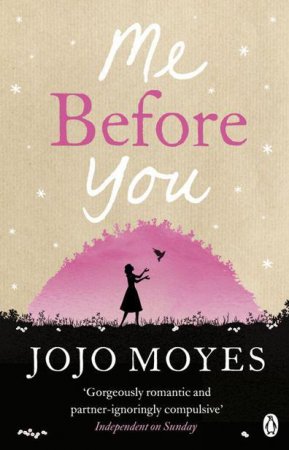 Me Before You
Me Before You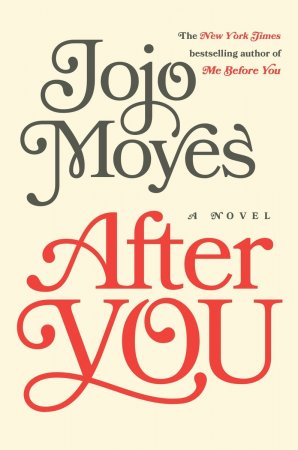 After You
After You The Last Letter From Your Lover
The Last Letter From Your Lover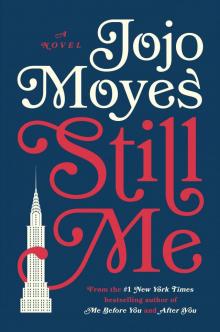 Still Me
Still Me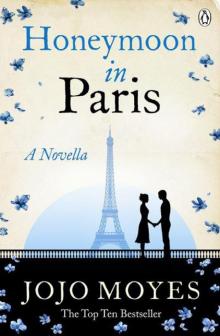 Honeymoon in Paris
Honeymoon in Paris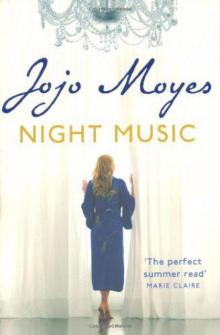 Night Music
Night Music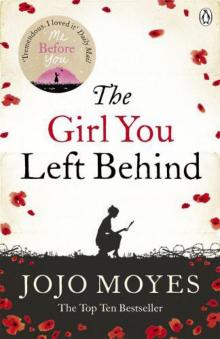 The Girl You Left Behind
The Girl You Left Behind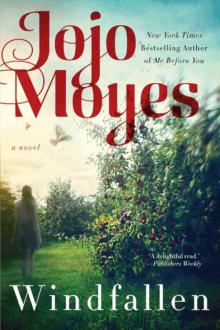 Windfallen
Windfallen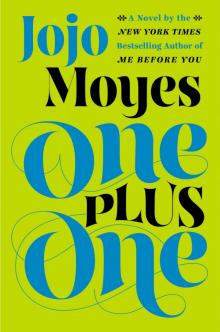 One Plus One
One Plus One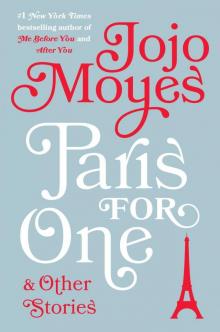 Paris for One and Other Stories
Paris for One and Other Stories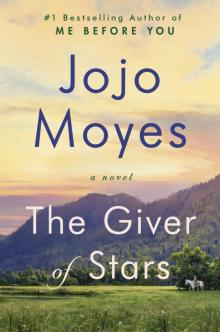 The Giver of Stars
The Giver of Stars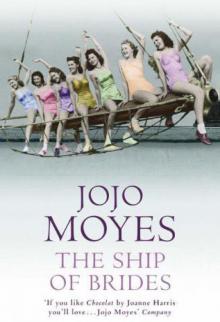 The Ship of Brides
The Ship of Brides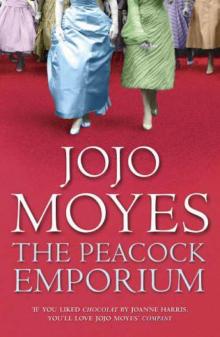 The Peacock Emporium
The Peacock Emporium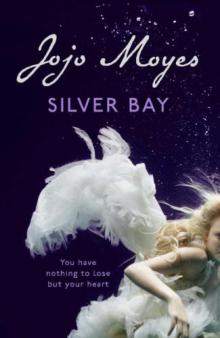 Silver Bay
Silver Bay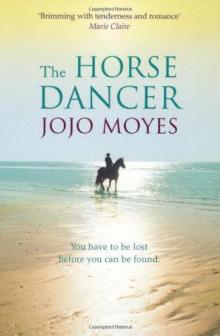 The Horse Dancer
The Horse Dancer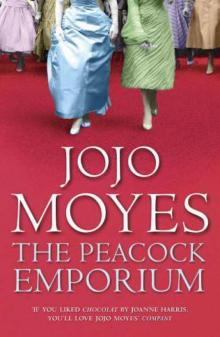 Peacock Emporium
Peacock Emporium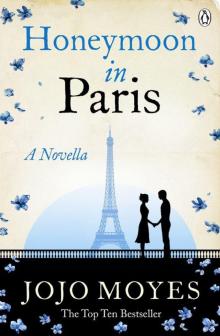 Honeymoon in Paris: A Novella
Honeymoon in Paris: A Novella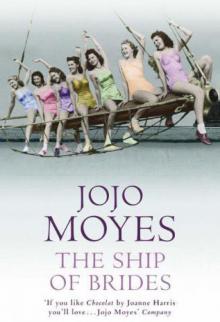 Ship of Brides
Ship of Brides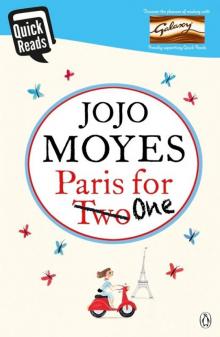 Paris For One (Quick Reads)
Paris For One (Quick Reads)